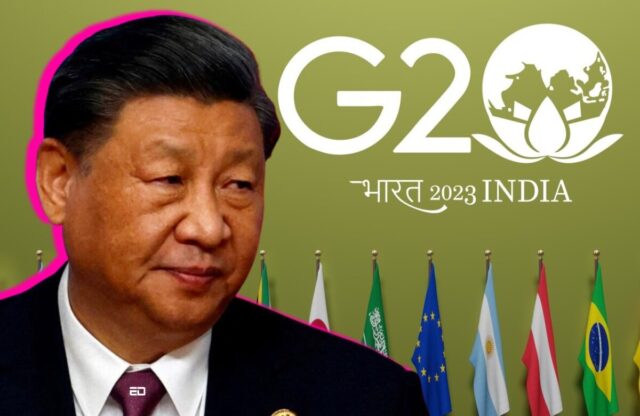China’s President Xi Jinping’s decision to skip the G20 Leadership Summit in New Delhi on September 9 and 10, 2023, has raised eyebrows and prompted speculation about its underlying causes.
While tensions between India and China have played a role in his absence, there are deeper internal conflicts within the Chinese Communist Party that may have contributed to this unexpected move.
Internal Party Dynamics
The Beidaihe seaside resort in China’s Hebei province has long served as a backdrop for an annual, highly secretive gathering of incumbent and retired leaders of the Chinese Communist Party (CCP).
This closed-door conclave is typically shrouded in secrecy, with little information reaching the public. However, this year, it stood out as markedly different from previous meetings, leaving political observers intrigued.
One of the striking developments at this year’s gathering was the bold and unprecedented reprimand reportedly directed at President Xi Jinping by influential party elders, among them Zeng Qinghong, a close confidant of former President Jiang Zemin.
The fact that such senior figures openly criticized the sitting CCP leader underscores the gravity of the concerns they raised.
At the heart of their criticism were several pressing issues that have been plaguing China. Firstly, they expressed deep apprehension about the country’s economic slowdown. China’s once-rapid economic growth had positioned it as a global economic powerhouse, but recent years have seen a notable deceleration, which has raised concerns about the CCP’s ability to maintain prosperity and public support.
A second major concern was the ongoing real estate crisis, which had cast a shadow over the stability of China’s financial system. Falling property prices and a growing debt burden in the real estate sector posed a substantial risk to the country’s economic health.
Youth unemployment, a growing problem in China, was another issue that the elders highlighted. As job opportunities became scarcer for the younger generation, it fueled social discontent and unrest—a potential threat to the party’s control over the population.
Also Read: ‘Absurd Claims:’ 5 Countries Join India In Rejecting China’s New Controversial Map
In addition to these domestic challenges, the elders expressed worries about controversies and issues within the Chinese military. This could include concerns over military readiness, discipline, and potentially even factionalism within the armed forces.
The crux of their message to Xi Jinping was unambiguous: if these critical problems persisted without effective solutions, the CCP faced the genuine risk of losing public support, thereby endangering its continued hold on power. The party’s historical legitimacy has long been tied to its ability to deliver economic growth and stability, making these criticisms particularly potent.
Jinping’s Sly Dig At His Predecessors
Rather than accepting responsibility for these issues, Xi Jinping deflected blame onto his predecessors, notably mentioning Deng Xiaoping, Jiang Zemin, and Hu Jintao.
Xi questioned whether he should shoulder the blame for the ongoing problems, despite being in power for over a decade. This unexpected reaction from China’s top leader left many within the CCP hierarchy perplexed and further underscored the depth of internal divisions within the party.
In this context, Xi Jinping’s decision to skip the G20 Summit in New Delhi could be seen as an attempt to avoid potential scrutiny and uncomfortable questions regarding China’s economic performance and internal political dynamics.
The internal turmoil within the CCP, coupled with mounting external challenges, has created a complex backdrop for Chinese leadership and its interactions on the global stage.
International Implications
Apart from internal party conflicts, Xi’s absence at the G20 Summit can also be linked to China’s strained relations with the United States and other nations. Despite diplomatic efforts, tensions between the U.S. and China persist, encompassing issues like the Russia-Ukraine war, Taiwan, the South China Sea, human rights, and economic restrictions.
This challenging international environment likely factored into Xi’s decision to avoid the summit, as it could have led to uncomfortable questions about China’s economic performance and geopolitical standpoints.
India’s External Affairs Minister S. Jaishankar downplayed Xi’s absence, stating that it would not impact the summit’s negotiations. He emphasized that leaders have skipped summits in the past, and Xi’s decision was not unusual.
Meanwhile, U.S. President Joe Biden expressed disappointment but hinted at a future meeting with Xi without specifying a date. U.S. National Security Advisor Jake Sullivan acknowledged that China had the option to be a “spoiler” at the summit due to border tensions with India but encouraged China to engage constructively in addressing global challenges.
President Xi Jinping’s decision to skip the G20 Summit in New Delhi has brought attention to not only the strained relations between India and China but also the internal conflicts within the Chinese Communist Party.
The reprimand he received from party elders, coupled with concerns about China’s economic challenges and international tensions, likely played a role in this absence. As the world watches the summit unfold, the spotlight remains on the evolving dynamics both within China’s political landscape and on the global stage.
China’s foreign ministry has stated its readiness to work with all parties for the summit’s success, emphasizing stable relations with India despite ongoing dialogue and communication at various levels.
Image Credits: Google Images
Feature Image designed by Saudamini Seth
Sources: First Post, The Economic Times, Indian Express
Find the blogger: Katyayani Joshi
This post is tagged under: China, Chinese, premier, President, G20, New Delhi, maps, internal conflict, Xi Jinping, reprimand, criticism, economic slowdown, scrutiny, Deng Xiaoping, Taiwan, Arunachal Pradesh, Aksai Chin
Disclaimer: We do not hold any right, or copyright over any of the images used, these have been taken from Google. In case of credits or removal, the owner may kindly mail us.
Other Recommendations:
China Gives ‘Ukraine-Like’ Warning To Asia; Don’t Let ‘Tragedy Be Repeated,’ Say Reports































